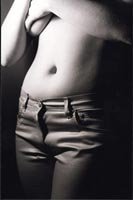From Duino Elegies
- - - Rainer Maria Rilke
Every angel is terrifying.
And so I hold myself back and swallow the call-note of my dark sobbing.
Ah, whom can we ever turn to in our need?
Not angels, not humans, and already the knowing animals are aware
that we are not really at home in our interpreted world.
Perhaps there remains for us some tree on a hillside, which every day we can take into our vision;
there remains for us yesterday's street and the loyalty of a habit so much at ease
when it stayed with us that it moved in and never left.
Oh and night: there is night, when a wind full of infinite space gnaws at our faces.
Whom would it not remain for--that longed-after, mildly disillusioning presence,
which the solitary heart so painfully meets.
Is it any less difficult for lovers?
But they keep on using each other to hide their own fate.
Don't you know yet?
Fling the emptiness out of your arms into the spaces we breathe;
perhaps the birds will feel the expanded air with more passionate flying.
...
This is a translation - there are others with different flavors.
Here is a bio - the original sites are impossible with pop-ups.
Writer and poet. He was born in Prague. A crucial fact in Rilke's life was that his mother called him Sophia. She forced him to wear girl's clothes until he was aged five - thus compensating for the earlier loss of a baby daughter.
Rilke's parents separated when he was nine. His father sent him to the military academy. Rilke did not enjoy his stay at academy and he was sent to a business school in Linz. He also worked in his uncle's law firm. Rilke continued his studies at the universities of Prague, Munich, and Berlin.
As a poet he made his debut at the age of nineteen with "Leben und lieder". In 1899. Rilke traveled in Russia visiting among others Tolstoy. During this period he started to write "The Book of Hours: The Book of Monastic Life" which appeared in 1905. He spent some time in Italy, Sweden, and Denmark, and joined an artists colony at Worpswede in 1903.
In 1901 Rilke married the young sculptress, Clara Westhoff. They had a daughter, Ruth, but marriage lasted only one year. During this period Rilke composed in rhymed the second part of "The Book of Hours". After he had separated from Clara, he settled in Paris to write a book about Rodin and to work for his secretary (1905-06). He also wrote "The Tale of the Love and Death of Cornet Christopher Rilke". During his Paris years Rilke developed a new style of lyrical poetry.
Rilke kept silence as a poet for twelve years before writing "Duino Elegies" and "Sonnets to Orpheus". In 1913 Rilke was forced to return to Germany because of the First World War. After 1919 he lived in Switzerland, occupied by his work and roses in his little garden. For time to time he went to Paris for a few months or to Italy. He had suffered from leukemia and spent much time at the Val-Mont sanatorium, but he died of an infection he contracted when he pricked himself on a rose thorn. - by Jelena.
Poetry and song and maybe culture

